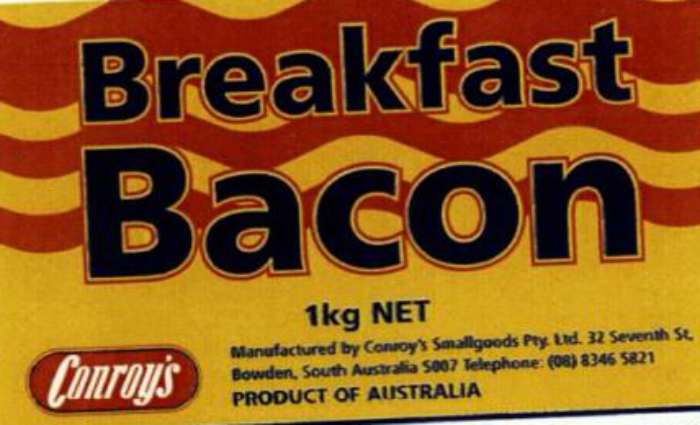
The ACCC has fined a series of Australian companies for breaching the new Country of Origin food labelling laws, but is finding it tough to stop imported fakes.
The latest is South Australian bacon producer Conroy’s, which was fined $10,200 for passing off imported Danish meat as ‘product of Australia’ on its labels.
The meat was a 1020kg one-off shipment to a wholesaler in WA and was used in its 1kg breakfast bacon packs in February.
Conroy’s has copped to telling porkies, with its director Andrew Conroy telling Fairfax the shipment had only effecting one customer.
“We made a mistake,” he says, adding the company imported meat from Denmark and elsewhere for other products, the labelling of which was ‘100 per cent correct’.
Conroys will also publish a corrective notice on its website and establish a competition and consumer compliance program.
[Related: More label printing news]
Other cases successfully prosecuted by the consumer watchdog include fining Carlton & United Breweries $20,400 for marketing its Byron Bay Pale Ale as being locally brewed, when it was actually made about 630km away at its Warnervale brewery.
A Victorian butcher was $50,000 for falsely claiming a product came from King Island, and several food companies have been slugged for passing off Turkish corn sugar as Victorian honey.
However, the ACCC has less luck taking action against the rampant sale of cheap imported goods claiming to be made from Australian ingredients.
Even worse is brands like Penfolds, and Reid Fruits cherries being ripped off and sold in Asia, where neither the watchdog nor the brands themselves have much power to act.
Examples include a green and gold ‘Aussie Beer’ actually made in China and Chilean-grown cherries being marketed as Australian. It is often difficult to tell the difference between fake and authentic.
ACCC Chairman Rod Sims says: “Many consumers have a preference for products that contain locally sourced ingredients and are often prepared to pay a premium for these products.
“As it is often difficult for consumers to determine where products come from, it is crucial that businesses provide accurate information about the place of origin of the goods that they supply.
“False claims of this kind not only mislead consumers but can also disadvantage competing suppliers, particularly those who source local ingredients for their products.”
Comment below to have your say on this story.
If you have a news story or tip-off, get in touch at editorial@sprinter.com.au.
Sign up to the Sprinter newsletter
